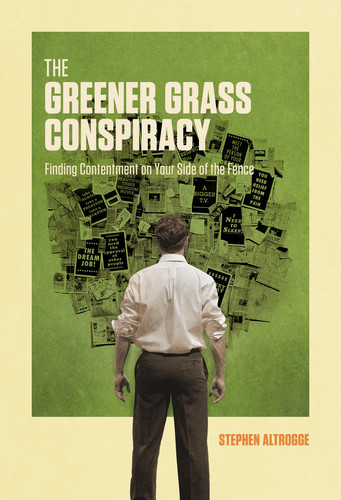Do you ever wonder how it’s possible to be so blessed and so unhappy at the same time? To live like kings and behave like ungrateful pigs? To have more than any generation in history and yet still crave more? What’s wrong with us? Is it the water? Is it cell-phone waves? Did we receive an experimental vaccination in our infancy? Nope. It’s the conspiracy. (pg. 12)
Stephen Altrogge’s new book, The Greener Grass Conspiracy: Finding Contentment on Your Side of the Fence, uses Scripture and a conversational tone to expose the spiritual and cultural forces that are determined to “poison the joy I have in God and to deceive me into believing that I can find happiness somewhere other than God. They want me to dishonor God by gorging on the unsatisfying pleasures of the world instead of finding true joy and satisfaction in Christ” (pg. 12).
Altrogge uses God’s Word to establish that “contentment is a disposition of the heart that freely and joyfully submits to God’s will, whatever that will may be” (pg. 28). He breaks the premise down with ancient and modern examples to demonstrate that true contentment isn’t tethered to circumstances or possessions. Rather, “contentment is inward, untouchable by circumstances, out of the reach of trouble. It can’t be stolen away by sickness or poverty, can’t be ruined by the loss of a job or house or spouse. Biblical contentment is not rooted in circumstances but in the infinitely stronger foundation of God himself” (pg. 30).
The Greener Grass Conspiracy explores the dark depths of idolatry, the lies of our materialistic culture, and our selfish tendency to complain.
When we complain, we’re loudly saying that the blessings of the gospel aren’t enough. We’re saying that the death of Christ isn’t enough. We’re saying that eternal fellowship with God, purchased at great cost to God, isn’t enough to satisfy our souls. We’re saying that forgiveness of sins and peace with God is nice, but not that nice. We’re saying that God “[has] not wisdom, or power, or mercy enough” to provide for us. We’re saying that God himself, who is the very definition of goodness, isn’t good enough. We would like a little something more, if you don’t mind. God plus [insert desire of choice] should do the trick. When we complain, we accuse God of being stingy, of not giving us enough.
Do you see the utter sinfulness of complaining? It tramples the gospel in the mud and paints God as a cosmic Scrooge. Even though God gave up what was most precious to him to bring us to himself, it’s not enough. Even though God proved his generosity with blood, we don’t believe him. God has emptied his pockets for us, and yet we complain.
The only way to cut the nerve of complaining is to regularly and actively remember and save and apply the gospel. Complaining doesn’t fare well in the soil of thankfulness, and the gospel should always propel us to deep gratitude. (pg. 72)
Altrogge explores the strength to be found in Christ through promises, prayer, and people, and ultimately encourages us to fix our eyes on Jesus.
True contentment is found in a Person. It’s not found in getting what we want or in having difficulty removed from our lives. Contentment isn’t the result of the absence of pain or the presence of material blessing. It’s found in Jesus Christ. Period. Without Christ we can never be truly content, regardless of the blessings that surround us. And with Christ we can be content in the midst of every circumstance. (pg. 87)
There are many wonderful gifts (marriage, friendships, children) on this side of death, “but if we stake our hope on them, we’ll find that we’ve been chasing shadows.”
Let’s allow our current battles with discontentment to serve as reminders of heaven. When you feel lonely, pray that God would bring you a godly, attractive spouse. Then thank Jesus that someday your pangs of loneliness will be destroyed in the joy of his presence. When you long for deeper friendships, pray that God would give you close, Jesus-loving pals. Then turn your eyes to the day when all friendships will be perfected in Christ. When your heart is breaking because you can’t conceive a baby, rest your broken heart in Jesus. Then, through the tears, look to the day when Jesus will wipe away every tear and say, “Well done, good and faithful servant.” We fight the battle of contentment through Christ who strengthens us, but one day the battle will be over. Let’s look ahead to that day. (pg. 134)
 The Greener Grass Conspiracy has 143 pages, 12 chapters, and 5 STOP-THINK-DO questions at the end of each chapter that are well-suited for discussion. I would highly recommend its exposure of idolatry, its call for contentment, and its prescription of a vibrant relationship with Christ—with one caveat. In Chapter 6, Altrogge writes from an evangelical perspective of “the great exchange” whereby sinners can be reconciled to God. For a more Biblically accurate treatment of God’s plan to redeem mankind and our response to God’s offer of grace, I would highly recommend Ken Craig’s The Big Picture of the Bible.
The Greener Grass Conspiracy has 143 pages, 12 chapters, and 5 STOP-THINK-DO questions at the end of each chapter that are well-suited for discussion. I would highly recommend its exposure of idolatry, its call for contentment, and its prescription of a vibrant relationship with Christ—with one caveat. In Chapter 6, Altrogge writes from an evangelical perspective of “the great exchange” whereby sinners can be reconciled to God. For a more Biblically accurate treatment of God’s plan to redeem mankind and our response to God’s offer of grace, I would highly recommend Ken Craig’s The Big Picture of the Bible.